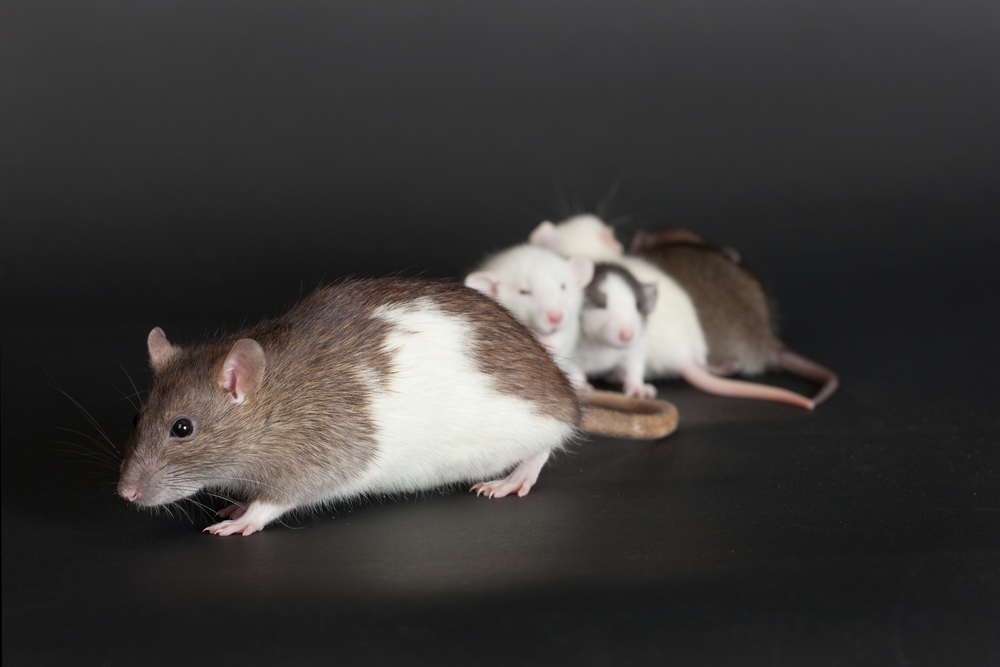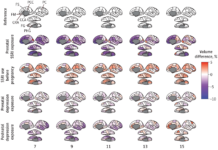A new study in rats found that those who had been exposed to antidepressants in utero had an impaired ability to nurture their own children in later life.
“These results demonstrate that early alterations to 5-HT signaling through SSRI exposure may disrupt nurturing parental behaviors and 5-HT receptor expression in affected female rat offspring,” the researchers write.
The researchers were led by Keaton A. Unroe at Virginia Tech’s school of neuroscience. The study was published in Developmental Psychobiology.
The researchers began with two groups of female rats: one group was exposed to SSRIs in utero, while the other group was not. The researchers then observed how the two groups of rats reacted to their own babies later on.
“Relative to controls, dams with a history of early-life SSRI exposure exhibited decreased maternal care, including diminished arched-back nursing, reduced licking and grooming of pups, and increased behavioral inconsistency,” the researchers write.
Specifically, rats exposed to SSRIs exhibited less licking and grooming of their pups during the nighttime, less arched-back nursing during the daytime, and went about their maternal care activities in an unpredictable and inconsistent manner compared with rats who were not exposed to SSRIs.
The researchers also examined the brains of the rats, finding that those exposed to SSRIs had abnormal serotonin receptor expression in two areas of the brain thought to be involved in maternal care, the medial preoptic area and the prefrontal cortex.
“When a developing fetus is exposed to SSRIs in utero,” the researchers write, “the SSRI-induced enhancement of serotonin can interfere with 5-HT-sensitive neurodevelopmental processes.”
The rats in this study were exposed to citalopram (Celexa), a popular antidepressant.
 In a study from 2016, female mice exposed to fluoxetine (Prozac) in utero also exhibited impaired maternal behavior, while male mice exposed to the same drug in utero exhibited increased aggression.
In a study from 2016, female mice exposed to fluoxetine (Prozac) in utero also exhibited impaired maternal behavior, while male mice exposed to the same drug in utero exhibited increased aggression.
One criticism of the study is that it involved only healthy rats. It could be argued that SSRIs used to treat the healthy might have a different effect than when used in those with depression.
However, in a previous study, researchers found that rats bred to exhibit “depressive-like” symptoms (anhedonia, passive stress coping, and psychomotor retardation) reacted to SSRIs with worsening symptoms over time. Rats who were bred to exhibit “normal” rat behavior had no reaction to SSRI “treatment.” That is, it seems that those prone to “depression” were actually more sensitive to the harmful and paradoxical effects of antidepressants.
It is important to note that a study in animals may not always give good information about how a phenomenon manifests in humans. However, rats have long been considered a good proxy for studying biological effects that would be considered unethical to study in humans. A randomized trial exposing children to antidepressants in the womb is impossible to conduct ethically on humans, much less studying their ability to nurture children decades later, so studies like this are the only way to glean this information.
Additionally, studies in humans have consistently found antidepressant use in pregnancy to be associated with myriad risks to neonatal health, including neonatal withdrawal syndrome, preterm birth, birth defects, developmental problems, cardiopulmonary problems, and even death.
In a 2021 study, researchers argued that antidepressants should be discontinued during pregnancy because of the risk of neonatal withdrawal syndrome. They identified symptoms of hypoglycemia, tremors, hypotonia, hypertonia, tachycardia, rapid breathing, and respiratory distress in babies born to mothers who used antidepressants.
Other research has found that antidepressant use during pregnancy alters brain development in the fetus. A study in JAMA Psychiatry found that antidepressant use during pregnancy increased the risk of infants with speech disorders, while a study in the American Journal of Psychiatry found that antidepressant use during pregnancy increased the risk of impaired neurological functioning in infants.
****
Unroe, K. A., Maltman, J. L., Shupe, E. A., & Clinton, S. M. (2022). Disrupted serotonin system development via early life antidepressant exposure impairs maternal care and increases serotonin receptor expression in adult female offspring. Developmental Psychobiology, 64(6), e22292. DOI: 10.1002/dev.22292 (Link)















Thanks for bringing one of these nasty studies into the light. You could cover one of these, every minute of every waking hour, for the rest of your life, and still only be exposing a small number of insane experiments.
As Dr Jerry Vlasak said, “” Here in the U.S., there are thousands of physicians like myself who realize there is no need to kill animals in order to help humans, the vast majority of whom get sick and die because of preventable lifestyle variables such as diet, smoking, drugs and environmental toxins.
In a country where 45 million people do without reliable access to ANY medical care, there is no reason to waste hundreds of millions of dollars testing drugs and procedures on non-human animals.
In a world where 20,000 children are dying from lack of access to clean water each week world wide, there is no reason to waste hundreds of millions of dollars testing drugs and procedures on non-human animals.””
Do we really need to torture animals with neurotoxins in order to arrive at the notion that neurotoxins ingested by pregnant women will adversely affect them and their unborn children?
Is that science or is that a bizarre refusal of acceptance?
This study has not advanced understanding. It joins thousands of others that simply keep understanding in the dark.
Report comment
So-called anti-depressants don’t “treat” anything. They’re anesthetics that not only blunt the feelings of those who use them, but the ability to adequately respond to the feelings of others and life in general.
Report comment
I don’t like to say “I told you so,” but…
https://www.baltimoresun.com/opinion/op-ed/bs-ed-op-0625-pregnancy-antidepressants-20170619-story.html
Report comment
And since taking care of one’s children has been declared “irrelevant to reality,” and “w/o work, content, and talent” – by those within the so called “mental health professions” – who never even bothered to look into the details of one’s life.
Let’s hope and pray, all are judged fairly, by God.
Report comment